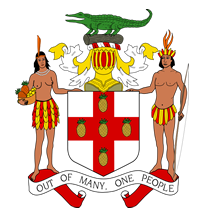The island - discovered by Christopher COLUMBUS in 1494 - was settled by the Spanish early in the 16th century. The native Taino, who had inhabited Jamaica for centuries, were gradually exterminated and replaced by African slaves. England seized the island in 1655 and established a plantation economy based on sugar, cocoa, and coffee. The abolition of slavery in 1834 freed a quarter million slaves, many of whom became small farmers. Jamaica gradually increased its independence from Britain. In 1958 it joined other British Caribbean colonies in forming the Federation of the West Indies. Jamaica gained full independence when it withdrew from the Federation in 1962. Deteriorating economic conditions during the 1970s led to recurrent violence as rival gangs affiliated with the major political parties evolved into powerful organized crime networks involved in international drug smuggling and money laundering. Violent crime, drug trafficking, and poverty pose significant challenges to the government today. Nonetheless, many rural and resort areas remain relatively safe and contribute substantially to the economy.
Jamaica is a parliamentary democracy under a constitutional monarchy and part of the Commonwealth realm.
Members:
Resources
Displaying 21 - 25 of 77Natural Resources Conservation Authority Act, 1991.
This Act consists of 44 sections and 3 Schedules. The sections are divided into 5 Parts: Preliminary (without number); National Resources Conservation Authority-Establishment and Functions (I); Financial Provisions, Accounts and Reports (II); Staff (III); General (IV).The National Resources Conservation Authority is established under section 3.
Quarries Control (Amendment) Act, 2015 (No. 8 of 2015).
This Act amends the Quarries Control Act in provisions concerning, among other things: fees, offences, (transfer of) licences, interpretations. It also inserts new sections on: the requirement for authorization of adjoining landowner or agent in case of quarry operations near to the boundary with adjoining land; continued quarrying in case of renewal of licence; receipts for quarry material; sampling of quarry material by the Commissioner; management of larger quarry areas by a qualified person.
Amends: Quarries Control Act, 1983. (2004)
Real Estate (Dealers and Developers) (Amendment) Regulations, 2010.
These Regulations amend the Real Estate (Dealers and Developers) Regulations in provisions concerning: licences for dealers, registration of dealers, and fees for development. They also insert a new regulation 5A on conditions to e complied with by a developer who wishes to have discharged from any land a charge that has been executed and lodged with the Registrar of Titles in favour of the Real Estate Board.
Amends: Real Estate (Dealers and Developers) Regulations. (2005)
Beach Control (Licensing) (Amendment) Regulations, 2015.
These Regulations amend the Beach Control (Licensing) Regulations, 1956 by: replacing the marginal note to regulation concerning manner and form of application and issue of licence; providing for the payment of fees specified in Column 2 of the Second Schedule; providing for the duration and renewal of a licence.
Amends: Beach Control (Licensing) Regulations, 1956. (2001)
Mortgage Insurance (Amendment) Act (No. 19 of 2014).
This Act makes minor amendments to sections 4, 5 and 14 of the Mortgage Insurance Act in respect of: percentage of the appraised value of the property to be mortgaged; the percentage of insurance fees; and income of the Jamaica Mortgage Bank.
Amends: Mortgage Insurance Act. (2011)


